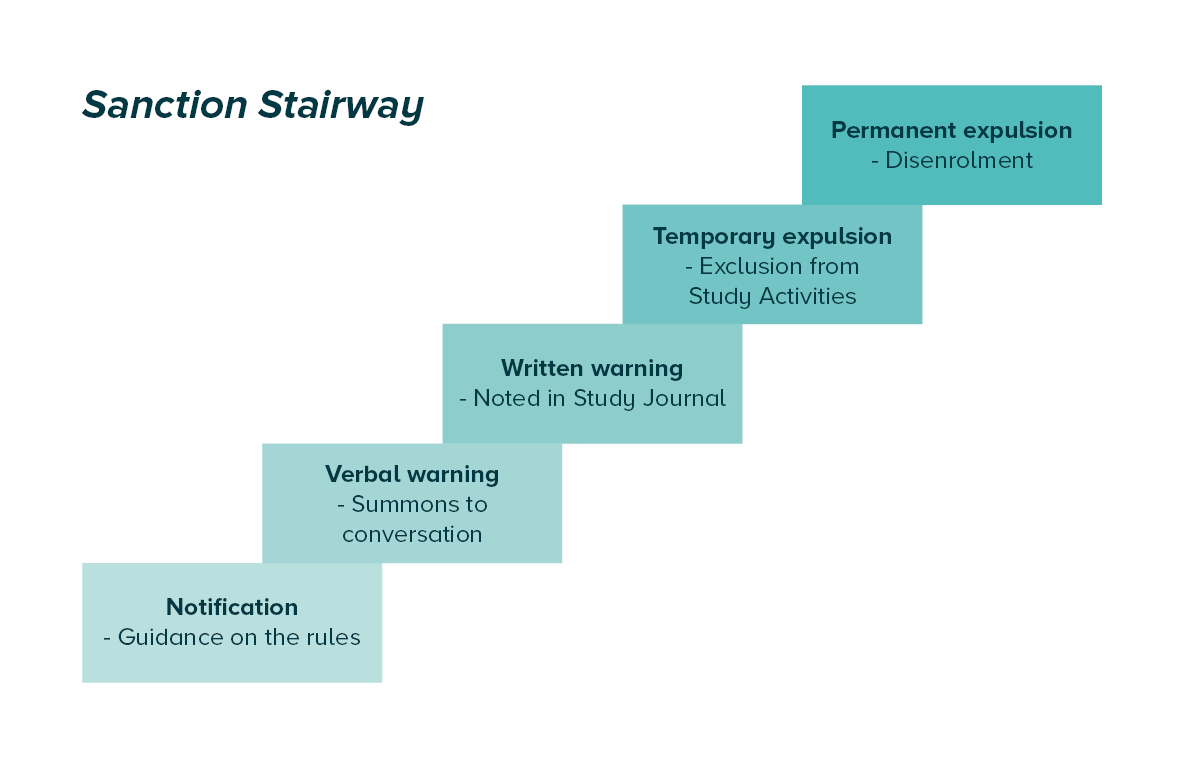Policies and rules
What is your right, and what is your duty?
UCL wishes to strengthen a good study- and work environment. Therefore we all need a mutual set of rules, that we can help each other to respect.
The policies and rules apply to all students and course participants in UCL.
Facts about rules and policies
Rules of conduct is to secure a safe and good learning environment
Everybody should thrive at UCL and have the best starting point for learning and for social interaction. The rules of conduct should help to ensure this.
Always contact your study programme manager or your student counsellor if you experience that the UCL's code of conduct is being violated or if you feel harassed.
Standards for contact and behavior
The set of behaviour rules, called ”Standards for contact and behaviour”, which UCL has created, contain information about the UCL smoking policy as well as UCL´s opinion on alcohol consumption, data safety, bicycle parking and much more.
The rules also describe the sanctions you can face, if you do not comply with the rules.
Standards for contact and behaviour.
Code of Conduct regarding online study activities
The set of rules should ensure that all parties can feel comfortable participating in and conducting online study activities.
Code of Conduct regarding online study activities.
Sexism and Sexual Abuse
UCL has also prepared a policy for students to make it clear where you can turn if you feel violated or are being subjected to sexism.
UCL policy on Sexism and Sexual Abuse
Consequences in case of violation of the guidelines for good behaviour
Below you will find an overview of UCL's sanction possibilites. The full version, including explanations, can be found in the 'Standards for contact and behaviour'.

Criminal offences will be reported to the police
UCL reserves the right - besides the sanction options already mentioned - to submit a police report regarding students, who are under suspicion of violating actual criminal laws, for instance regaring violence, weapons, drugs, data security etc.
UCL Policy on Students with Disabilities
The purpose of the UCL Policy on Students with Disabilities is to ensure, that students with disabilities have access to all study activity on equal terms with students, who do not have a disability.
UCL Policy on Students with Disabilities
Action Plan for the UCL Policy on Students with Disabilities
During your studies, you will work with personal data. For example, if you collect information about people for a project, assignment or exam.
Therefore you need to know something about data protection - also called GDPR.
Don't worry, you don't need a higher law degree, click into the Service Portal and you will find everything you need about GDPR.
Based on information from the Danish Civil Registration System, you are registered in our student administration system as having name and address protection in accordance with section 28 of the Civil Registration System Act.
We shall inform you about how your protection is registered.
Despite having name and address protection, your name will appear in the systems which are used by UCL as e.g. Wiseflow, the Internship portal and Itslearning. This is necessary in order for you to complete your education such as learning activities, participation registration, qualification requirement, exams and internship. Your name and address will not be shared with unauthorized personnel.
In the Internship portal – contrary to the other systems - we usually inform about the student’s address, but in your case it shall say “Secret” which means that your future internship placement cannot see where you live.
If you need your correct first name not to appear on the UCL systems, you may address study service in order to use another first name. It is only in the event of a real need for protection that your first name can be changed.
You have to be aware that it will then be that first name which you have to identify yourself with in connection with lessons, internship etc.
If you during your education are participating in company visits, fairs, study trips, satisfaction surveys workshops and so on it is recommended to provide the host with information about name and address protection according to the Civil Registration System Act § 28. It says that it is not allowed to distribute your name and address to other parts without your affirmative consent. You may write “I shall inform that I am protected by name and address protection according to § 28 of the Civil Registration System Act”
If you wish to cancel your name and address protection, you will have to do this yourself on the citizens' website: borger.dk. Follow this LINK.
